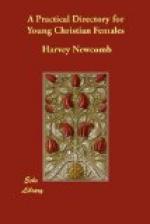portion in each, every day. If you begin at Genesis,
Job, and Matthew, and read a chapter every day, at
each place, omitting the first, and reading three
Psalms, on the Sabbath, you will read the whole Bible
in a year, while on every day you will have a suitable
variety. Besides this, the more devotional and
practical books should be read frequently. The
Psalms furnish a great variety of Christian experience,
and may be resorted to with great profit and comfort,
under all circumstances. This is the only book
in the Bible which does not require to be read in course.
The Psalms are detached from each other, having no
necessary connection. The other books were originally
written like a sermon or a letter. They have,
for convenience, since been divided into chapters and
verses. If you read a single chapter by itself,
you lose the connection; as, if you should take up
a sermon and read a page or two, you would not get
a full view of the author’s subject. I
would therefore recommend that, in addition to your
daily reading in the Old and New Testaments, you have
also some one of those books which require most study,
in a course of reading, to take up whenever you have
an occasional season of leisure to devote to the study
of the Bible. But, when you have commenced one
book, finish it before you begin another. You
will find great advantage from the use of a reference
Bible and concordance. By looking out the parallel
passages, as you proceed, you will see how one part
of the Scriptures explains another, and how beautifully
they all harmonize. This will also give you a
better view of the
whole Scriptures than you
can obtain in any other way. But if you are a
Sabbath-school teacher or scholar, your regular lesson
will furnish as much study of this description as
you will be able thoroughly to accomplish.
(5.) In reading the Scriptures, there are some subjects
of inquiry which you should carry along with you constantly:
1. What do I find here which points to Christ?
Unless you keep this before your mind, you will lose
half the interest of many parts of the Old Testament.
Indeed, much of it will otherwise be almost without
meaning. It is full of types and prophecies relating
to Christ, which, by themselves, appear dry, but,
when understood, most beautiful and full of instruction.
2. Remember that the Bible contains a history
of the church. Endeavor, then, to learn the state
of the church at the time of which you are reading.
For the sake of convenience, and a clearer view of
the subject, you may divide the history of the church
into six periods: (1.) From the fall of Adam
to the flood. (2.) From Noah to the giving of the law.
(3.) From that time to David and the prophets. (4.)
From David to the Babylonish captivity. (5.) From
that time till the coming of Christ. (6.) From Christ
to the end of time, which is called the gospel dispensation.
From the commencement you will see a gradual development
of God’s designs of mercy, and a continually




